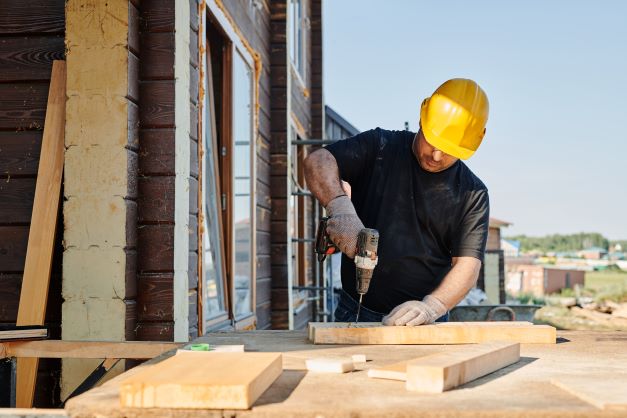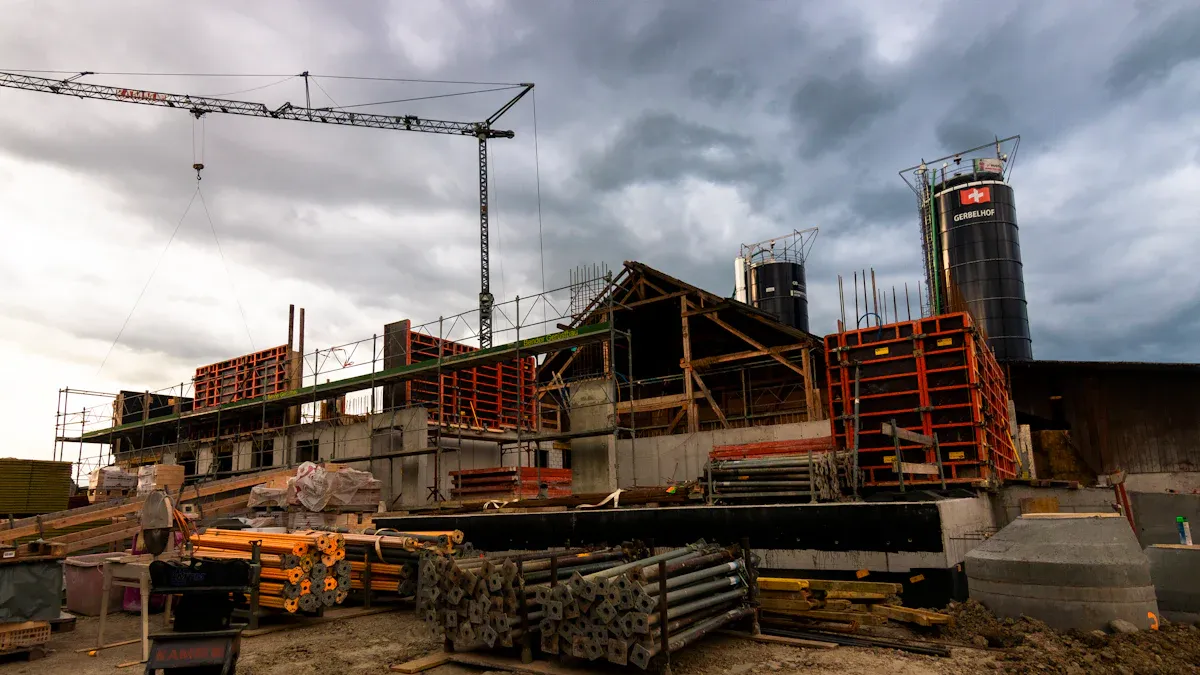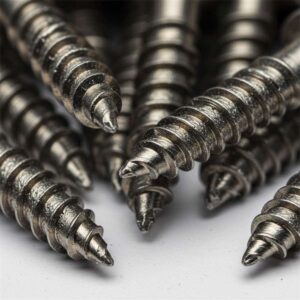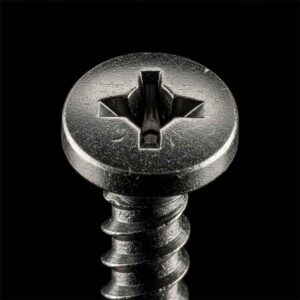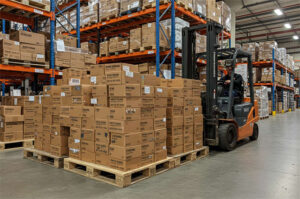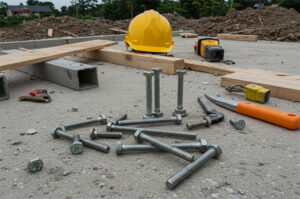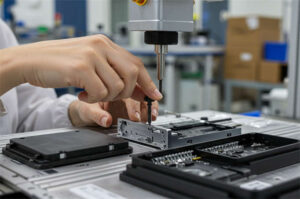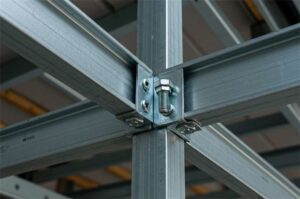In 2025, bolts and screws are both popular for building things. New smart fasteners can check tension, temperature, and vibration. These features help you find problems early. This makes things safer and more reliable. You also get wireless communication and data analytics in these systems. When you pick bolts or screws, think about strength, cost, and your project type. Each choice works best for certain needs. Modern standards keep changing as technology grows.
Principais conclusões
- Bolts are very strong. They work well for big jobs like bridges and steel frames. Use bolts when you need safety and strength.
- Screws can be used for many things. They are good for lighter jobs like woodwork and drywall. Screws go in fast and often do not need holes first.
- Smart fasteners have sensors. They check tension and vibration right away. This helps keep construction safe and reliable.
- Pick the right fastener for your project and material. Always choose bolts or screws that fit your needs. This helps them work their best.
- Materials that resist rust, like stainless steel, last longer. They are good for outside or tough places.
Bolts and Screws Overview
Parafusos
You often use bolts when you need strong connections in construction. Bolts have external threads and work with a nut. This design lets you join two or more materials tightly. You need to drill holes before you install bolts. You also need a wrench or socket to tighten them. Bolts give you high load-bearing capacity. You see bolts in heavy-duty projects like steel frames, bridges, and machinery. When you want strength and reliability, bolts are a top choice.
Parafusos
Screws work well for lighter and medium-duty projects. You can install screws directly into wood, metal, or plastic. Many screws create their own threads as you drive them in. This means you do not always need to drill a hole first. You use a screwdriver, drill, or impact driver to install screws. Screws hold materials together tightly, but they do not match the strength of bolts. You often use screws for woodworking, drywall, and decking.
Principais diferenças
Dica: Knowing the main differences helps you pick the right fastener for your project.
Aqui está uma comparação rápida of bolts and screws:
| Recurso | Parafusos | Parafusos |
|---|---|---|
| Tópicos | External, used with a nut | Self-tapping, create their own hold |
| Força | High load-bearing capacity | Moderate strength |
| Tools Required | Chave inglesa ou soquete | Screwdriver, drill, or impact driver |
| Pre-Drilled Holes | Always needed | Sometimes needed |
| Formulários | Heavy-duty construction, machinery | Woodworking, drywall, decking |
Bolts and screws both play important roles in construction. Bolts give you more strength and work best for heavy loads. Screws offer speed and flexibility for lighter jobs. When you understand these differences, you can choose the right fastener for your needs.
Strength & Reliability
Bolts and Screws: Strength
When you build something strong, you want to know which fastener will work best. Bolts and screws both give strength, but they do it in different ways. Bolts can hold a lot of weight. People use bolts for steel frames and bridges. Bolts are also used for other heavy jobs. Bolts use nuts to hold things together tightly. This helps bolts handle strong pulling and cutting forces.
Screws also make strong connections, especially new structural screws. These screws are made from tough, heat-treated steel. You can put structural screws right into wood or special lumber. You do not need to drill holes first like with lag bolts. Structural screws can be thinner than lag bolts. They can still hold as much or even more weight. People use these screws for heavy framing, strong decks, LVL fastening, and ledger boards.
Observação: High-strength bolts and high-strength screws both use alloy steel. They can handle a lot of pulling and stress in tough places.
Here is a table to help you see how bolts and screws work under stress:
| Type of Fastener | Material | Principais características |
|---|---|---|
| High-tensile bolts | Liga de aço | Made to handle lots of pulling and stress |
| High-tensile screws | Liga de aço | Heat-treated to handle stress and not break easily |
If you use cheap fasteners, your project might not be safe. Always pick good bolts and screws for safety and strength.
Durabilidade
You want your fasteners to last, even in hard places. How long they last depends on the material and where you use them. Bolts and screws made from alloy steel or carbon steel work well for tough jobs. They fight stress and rust better than regular steel.
The environment can change how long fasteners last. Hot and cold can make bolts and screws get bigger or smaller. This can make them loose over time. Wet air can cause water to build up. This can make rust and weak fasteners. Using stainless steel bolts or screws helps stop rust in wet places.
Here is a quick look at how different conditions change fasteners:
| Environmental Condition | Effect on Fasteners |
|---|---|
| Room Temperature Dry (RTD) | Normal performance |
| High Temperature Wet (HTW) | More risk of getting bigger and rusting |
| Low Temperature Wet (LTW) | Water can cause damage |
- You can make fasteners last longer by:
- Picking materials that do not rust, like stainless steel.
- Checking fasteners often for rust or if they are loose.
- Using the right fastener for each job.
Bolts and screws both help keep your projects strong and safe. When you pick the right type and material, your structure will last longer and stay safe.
Innovations in 2025
Smart Fasteners
You now see smart fasteners on many job sites. These fastening devices have sensors inside. The sensors track stress, temperature, and vibration. You get real-time data about the health of your structure. This helps you spot problems before they become serious. You can use your phone or computer to check the data. Smart fasteners make your work safer and more reliable.
Dica: Smart fasteners help you save time on inspections. You do not need to take things apart to check for problems.
You also see more automation and robotics in fastener installation. Machines can place bolts and screws with high precision. This makes your projects faster and more accurate. You spend less time fixing mistakes.
Here is a table showing the biggest changes in fastener technology for 2025:
| Innovation Type | Descrição |
|---|---|
| High-performance materials | New materials make bolts and screws stronger and more reliable. |
| Automation and robotics | Machines install fasteners quickly and with great accuracy. |
| Sustentabilidade | Eco-friendly fasteners help you meet new environmental rules. |
| Smart fasteners | Sensors in fasteners give you real-time updates on your structure’s health. |
Parafusos Estruturais
Structural screws have changed how you build with wood. These screws are thinner and sharper than lag bolts. You do not need to drill a hole first. You can drive them straight into wood, metal, or even composite materials. This saves you time and effort.
Structural screws meet strict building codes. They have high shear and tensile strength. You can use them for decks, beams, and heavy framing. They also have special coatings that protect them from rust. You get a strong hold and a long-lasting connection.
Here is a table comparing structural screws and lag bolts:
| Recurso | Parafusos Estruturais | Parafusos |
|---|---|---|
| Shear and Tensile Strength | High strength for heavy loads | Lower strength |
| Instalação | No pre-drilling needed, quick to install | Needs pre-drilling, slower |
| Code Compliance | Meets modern building codes | May not meet all standards |
| Material Versatility | Works with wood, metal, and composites | Mostly for wood |
| Durabilidade | Advanced coatings for rust protection | Standard coatings |
| Relação custo-benefício | Saves labor and project costs | More labor needed |
Observação: Timberlock screws are a popular type of structural screw. You can use them for decks, fences, and timber frames. They make your work faster and safer.
You also find self-drilling screws. These screws drill, tap, and fasten in one step. You do not need extra tools or steps. This makes your fastening jobs much easier.
Resistência à corrosão
You want your bolts and screws to last a long time, even in tough weather. Corrosion-resistant fasteners help you do this. Stainless steel bolts and screws work well in wet or salty places. They do not rust easily. You spend less time and money on repairs.
Galvanized screws also protect against rust. They have a special coating. You may need to check them more often in harsh conditions. Rust-resistant screws help your projects last longer. You do not need to replace them as often.
Here are some key points about corrosion-resistant fasteners:
- Stainless steel bolts and screws last longer and need less care.
- Galvanized screws give good rust protection but may need more checks.
- Rust-resistant screws save you money by reducing replacements.
Alert: Always choose the right fastener for your environment. This keeps your structure safe and strong.
You now have many choices for fastening in 2025. New bolts and screws, smart fasteners, and better coatings help you build safer and faster. You can trust these new fastening devices to meet modern standards and save you time.
Code & Standards
Parafusos
You have to follow strict building codes when using bolts. These codes make sure your connections are safe and strong. Most codes tell you what size, spacing, and placement to use. Bolts are common in steel frames, bridges, and big structures. Bolts come in different grades with different strengths. Always check the grade before you start.
Here is a table that shows some bolt grades and how they are used:
| Tipo de Parafuso | Material | Minimum Tensile Strength | Formulários |
|---|---|---|---|
| ASTM A325 | Medium-carbon steel, quenched and tempered | 120,000 psi (for bolts up to 1″ in diameter) | General structural connections, such as in steel buildings and pedestrian bridges. |
| ASTM A490 | Alloy steel, quenched and tempered | 150,000 psi | High-strength requirements, such as long-span bridges or heavy-load support beams. |
You need to follow these basic rules for bolts:
- Anchor bolt diameter must be at least ½-inch.
- Bolts should not be more than 6 feet apart.
- Use two or more bolts for each plate section.
- Put bolts in the middle third of the plate width.
🛠️ Dica: Always check your local codes before you begin. Some buildings have even stricter rules.
You also need to:
- Put plate washers on all anchor bolts along braced wall lines.
- Use cut washers for wall sections that are not braced.
- In buildings over two stories, space bolts no more than 4 feet apart.
Parafusos
Modern codes now say screws are strong enough for many jobs. You must use screws with published load ratings and certifications. Look for ICC-ES or ESR approval on your screws. This means your screws meet building code rules. Certified structural screws can hold heavy loads and keep your building safe.
Here is a table to help you know what to look for in structural screws:
| Evidências | Descrição |
|---|---|
| Structural Screws Certification | Screws must have published load ratings and certifications like ICC-ES or ESR approval for building code compliance. |
| Load-Bearing Capability | Structural screws are load-bearing when rated and certified for structural use, ensuring safety in critical connections. |
| Performance Standards | All fasteners must meet required performance standards to aid in the design and construction of reliable structures. |
Always check the packaging for certification marks. Only use screws that meet the right standards for your job. This helps you pass inspections and keeps your building safe.
📋 Observação: Bolts and screws both need to meet code standards. Using the right fastener and following the rules will help your project last longer and stay safe.
Cost Factors
Material Costs
You need to think about material costs when you choose bolts and screws for your project. Bolts often cost more than screws because they use more metal and need nuts and washers. You see bolts in heavy-duty jobs, like steel frames and bridges. Screws usually cost less, especially for light and medium-duty work. You buy screws in bulk for woodworking, drywall, and decking. Some new screws, like structural screws, cost more than regular ones. These screws offer better strength and meet modern building codes.
Here is a table to help you compare material costs:
| Tipo de prendedor | Average Cost per Unit | Usos comuns |
|---|---|---|
| Parafusos | Mais alto | Steel frames, machinery |
| Parafusos | Inferior | Woodworking, decking |
| Parafusos Estruturais | Moderate to High | Heavy framing, decks |
💡 Dica: You save money by picking the right fastener for each job. Do not use bolts where screws work well.
Instalação
Installation costs can change your budget. Bolts take more time to install. You need to drill holes, use nuts, and tighten with a wrench. Screws install faster. You use a drill or impact driver. You do not always need to drill a hole first. This saves you time and labor.
In commercial construction, new fastening systems like EM-BOLT® help you save money. Contractors report saving 80-100 man-hours on office buildings by using these bolts. You finish projects faster and reduce labor costs. Time savings can cut weeks off large projects.
You see these benefits when you choose the right fastener:
- Bolts need more steps and tools for installation.
- Screws install quickly with fewer tools.
- Advanced bolts and screws, like EM-BOLT® and structural screws, save time and money.
- Faster installation means lower labor costs and shorter project schedules.
🚀 Observação: You lower your total costs by using fasteners that install quickly and meet code standards.
Bolts and screws both affect your budget. You need to balance material costs and installation time. Smart choices help you finish your project on time and within budget.
Use Cases
Heavy Duty
You often face projects that need strong connections. Bolts work best for heavy-duty jobs. You see bolts in bridges, buildings, and large machines. Hexagonal bolts join steel beams and structural parts. Lag bolts fasten wood and heavy materials. Anchor bolts secure foundations and heavy equipment. These bolts give you high strength and reliability. When to use bolts? Choose them for load-bearing tasks and places where safety matters most.
| Type of Bolt | Applications in Heavy-Duty Projects |
|---|---|
| Hexagonal bolts | Bridges, buildings, structural components |
| Lag bolts | Fastening wood, heavy materials |
| Parafusos de ancoragem | Securing foundations, heavy machinery |
🏗️ Tip: Parafusos e roscas both have their place, but bolts are your go-to for heavy-duty construction.
Light & Medium Duty
You handle many tasks that do not need maximum strength. Screws fit light and medium-duty jobs well. Screws install quickly and hold materials like wood, drywall, and thin metal. You use screws for cabinets, shelving, and trim. Screws offer a balance between strength and ease of use. When to use screws? Pick them for projects that need speed and flexibility, not heavy loads.
| Type of Fastener | Nível de serviço | Formulários |
|---|---|---|
| Parafusos | Serviço leve | Lightweight, non-structural, easy to install |
| Parafusos | Serviço médio | Versatile, suitable for many tasks |
| Parafusos | N/A | Heavy-duty, high strength and reliability |
Note: Screws work best for quick fixes and everyday repairs. Bolts are not needed for these jobs.
Timber & Decking
You want your deck or timber project to look good and last long. Screws are the top choice for fastening deck boards and timber. Screwing boards into joists gives you a secure and affordable result. Screws work well with pressure-treated wood and solid-edge boards. Many homeowners now prefer hidden deck fasteners for a clean finish. You avoid exposed nails, which makes your deck safer.
“Screwing deck boards directly into the joists is a proven method that’s fast, secure, and affordable. Screws are especially common in pressure-treated wood decks and solid-edge boards that don’t have grooves.”
- You get a polished finish with a fastener-free surface.
- No exposed nails to step on or trip over.
- Screws hold boards tightly for lasting performance.
- Screws and nails do not pop up when installed correctly.
- Screws counter-sink cleanly with TimberTech AZEK decking.
You can explore TimberTech decking lines and hidden fasteners. Pair your favorite board with the recommended fastener for the best results.
Tip: Bolts and screws both work in timber, but screws give you more options for decking and outdoor projects.
You now know when to use bolts and when to use screws for each type of project. The right choice makes your work safer and more efficient.
Tabela de comparação
Quick Reference
You often need to compare bolts and screws before you start a project. This quick reference table helps you see the main differences at a glance. You can use it to pick the right fastener for your job.
| Recurso | Parafusos | Parafusos |
|---|---|---|
| Força | High tensile and yield strength. Handles heavy loads and stress. | Good strength for light and medium-duty tasks. New structural screws can match lag bolts. |
| Custo | Higher cost per unit. Needs nuts and washers. | Lower cost for most types. Structural screws cost more but save labor. |
| Durabilidade | Very durable. Alloy steel and coatings resist corrosion. | Durable with advanced coatings. Stainless and galvanized screws last longer. |
| Instalação | Needs pre-drilling and tightening with tools. Slower process. | Quick to install. Many screws are self-tapping and need no pre-drilling. |
| Code Compliance | Meets strict building codes for heavy-duty work. | Many structural screws have ICC-ES or ESR certification. Check for code approval. |
🛠️ Dica: Always check the grade, material, and coating of your bolts and screws. These factors affect strength and durability.
You can also look at these key metrics when comparing fasteners:
- Diameter: Wider bolts give more strength.
- Thread pitch: Tighter threads hold better.
- Material: Steel, stainless steel, and coatings change how long fasteners last.
- Grade: Higher grades mean more strength.
- Coating: Protects against rust and weather.
Many structural screws now meet strict codes. You save time because you do not need to pre-drill. This makes fastening faster and easier on busy job sites.
Note: Pick bolts for heavy loads and safety. Choose screws for speed and flexibility. Both help you build strong, lasting structures.
Choosing for Your Project
Por Material
You should pick bolts and screws that match your materials. Every material needs a certain kind of fastener. For wood, screws are a good choice. They hold tight and help stop wood from splitting. Self-tapping screws work best with soft things like wood or plastic. If you use steel or thick metal, self-drilling fasteners help you save time. These fasteners make their own holes. Stainless steel fasteners do not rust easily. You use them outside or near water. Plated steel gives more protection from rust for everyday jobs. Brass is great for electrical work. It does not attract magnets and fights rust.
Here is a table to help you choose the right fastener for each material:
| Tipo de prendedor | Ideal Material Use | Key Considerations |
|---|---|---|
| Parafusos autorroscantes | Wood, plastic, thin metal | Drill pilot holes to prevent splitting |
| Self-drilling fasteners | Steel, thick metal | No pilot hole needed |
| Aço inoxidável | Outdoor, marine, chemical areas | Strong and corrosion-resistant |
| Plated steel | General construction | Enhanced corrosion resistance |
| Latão | Electrical applications | Nonmagnetic and corrosion-resistant |
Tip: Always use the right tools for the job. Tighten fasteners so they stay secure. Put some lubricant on threads to lower friction and stop damage.
By Project Type
You need to think about your project before picking bolts or screws. Bolts are best for big jobs like holding beams, machines, or frames. Use bolts when you need lots of strength and want things to stay together. Screws are better for lighter jobs like cabinets, decks, or things you might take apart later. Use screws when you want to install things fast and remove them easily.
Keep these ideas in mind when you pick fasteners for your project:
- Bolts work well for heavy-duty jobs and things that stay put.
- Screws are good for lighter jobs and can be used for both permanent and temporary fixes.
- Check how much weight your joint will hold.
- Pick a fastener material that fits the place, like stainless steel for outside.
- Think about if you will need to take the fastener out later.
Note: Bolts use nuts to make connections even stronger. Screws go right into the material and have high tensile strength to hold things tight.
When you pick the right fastener for your material and project, your work is safer and easier. Bolts and screws are both important in building. Always match your fastener to what you need.
You have more ways to fasten things in construction now. Smart fasteners show you data right away and help you find problems early. Structural screws save time and follow strict rules. Bolts are best for heavy jobs. Screws are good for lighter work. Use bolts when you need strength and safety. Use screws when you want speed and easy changes. The table below shows how new technology changes your choices:
| Technology | Benefício |
|---|---|
| IoT-enabled fasteners | Real-time monitoring for safety and strength |
| Self-locking thread tech | Less loosening, more reliability |
| Advanced materials | Better sustainability and performance |
You can build safer and faster if you pick the right fastener and follow today’s rules.
Perguntas frequentes
What is the main difference between bolts and screws?
Bolts need nuts to hold materials together. Screws make their own threads in the material. You use bolts for heavy-duty jobs. You use screws for lighter tasks.
Can you use screws instead of bolts for structural work?
Você pode usar parafusos estruturais for some heavy jobs. These screws meet building codes and hold strong. Always check if your project needs bolts for extra safety.
How do smart fasteners help in construction?
Smart fasteners have sensors. You get real-time data about tension and vibration. This helps you spot problems early. You keep your structure safe and reliable.
Which fastener lasts longer outdoors?
Stainless steel bolts and screws last longer outside. They resist rust and weather. You should pick these for decks, fences, and outdoor furniture.
Are bolts more expensive than screws?
Bolts usually cost more. You need nuts and washers. Screws cost less for most jobs. Structural screws may cost more but save you time during installation.
